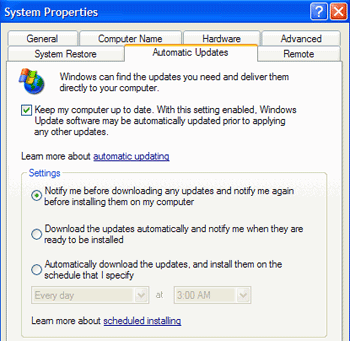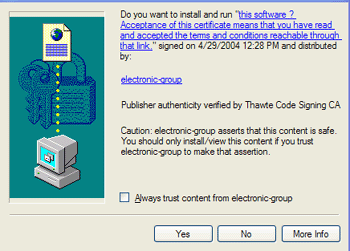In the
worst case scenario, a browser hijacker can make
the Internet almost impossible to use, popping up legions of advertising windows
and directing you helplessly to sites of its choosing. These programs often
use a combination of hidden files and a registry settings to
reinstall themselves after removal, so deleting them or changing your IE
settings back may well not work.
A much older practice that
some shady websites use is to bombard you with advertising popups, some spawning
new popup adds when closed, and some lacking any close controls at all,
rendering them difficult to get rid of. While this is not technically browser
hijacking - it does not affect the functioning of your web browser - it still
has the effect of disrupting your surfing experience.
Part 1: preparation and precautions
You can
massively reduce the risk of your browser being taken
over by a hijacker by taking a few simple precautions. First and foremost is to
update Windows by going to https://windowsupdate.microsoft.com . this advice is in
every security guide we have ever published, and for good
reason.
microsoft, whatever
people might say, is very active in the area of security and is constantly
patching and updating program vulnerabilities which allow things like browser
hijacking.
by keeping your machine up to
date with the latest service packs and patches, you can eliminate a whole range
of potential trouble. many browser hijackers are geared to attack areas of
vulnerability in windows and internet explorer which have since been patched.
provided you are up to date, you avoid a raft of potential trouble.
 The automatic update function
included in Windows XP (and Windows 2000 service pack 3) is a convenient way to
make sure you are up to date. To enable this feature, right click on 'my
computer' and select properties, then choose the 'automatic updates'
tab.
The automatic update function
included in Windows XP (and Windows 2000 service pack 3) is a convenient way to
make sure you are up to date. To enable this feature, right click on 'my
computer' and select properties, then choose the 'automatic updates'
tab.
If it is not
already, check the 'keep my computer up to date…' checkbox to enable automatic
updating.
Now run Windows update from
'start\all programs\windows update' to make sure you are correctly patched for
now.
Use common sense
A majority of
browser hijacking programs will actually request your permission before installing themselves. If only real hijackers were
so polite… Anyhow, the point is if anything requests permission to install on your
system while you are browsing the 'net, say NO unless you are
absolutely darn sure you know what it is, and what it does.
This
excellent surfing habit will also protect you from many forms of spyware and
adware such as the omnipresent Gain\Gator\Claria Corporation software. (See our guide to removing adware and spyware
for more details.
 Funny how many of the same
street-proofing techniques you learned as a kid apply on today's Internet…
"Kids, just say NO to spyware!"
Funny how many of the same
street-proofing techniques you learned as a kid apply on today's Internet…
"Kids, just say NO to spyware!"
Use and update an anti-spyware
program regularly
Ad-aware and Spybot S&D are the
two anti-spyware programs that we recommend using. Since browser hijackers are
considered an offshoot of the whole spyware\adware\malware phenomenon, both
these programs are capable of detecting and often eliminating our current
subject. Keep them updated and scan with them often to keep your PC of unwanted
'marketing initiatives' as well as browser hijackers.
Again,
see our guide to spyware and adware removal
for details on using these
two programs.

